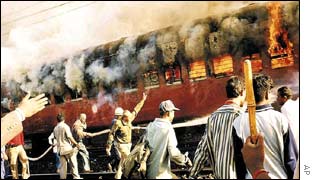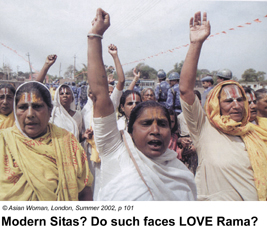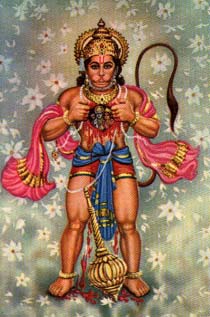Devil worship in Ayódhya
|
 |
| © BBC News Ancient Babri Mosque in Ayódhya destroyed by Hindu agitators in 1992. Thousands killed in subsequent religious rioting. |
In 1992 religious riots in India and Bangladesh were sparked which left several thousand dead, when a group of politically motivated Hindus tried to right a wrong committed by Muslims 500 years earlier and demolished an ancient but unused mosque that had been erected by Muslim conquerors of the time in place of a temple which marked the birthplace of Lord Ráma. The government imposed a stand-off and put the matter into the hands of a court which in ten years was unable to produce an equitable decision. The Hindu faction then announced that, on 15 March this year, they would go ahead with the building regardless of consequences.
 |
| © BBC
News |
On 28 February 2002 a train with Hindu devotees coming from the disputed site was set alight by a gang of Muslim youths. 58 Hindus were burnt alive. This sparked off Hindu reprisals against Muslims in which more than six hundred people died both sides.
In this article, Ashutosh Vardhana, a Hindu writer from England, argues that the temple project offended against the spirit of Hinduism and is in fact blasphemy.
![]() Ashutósh
Várdhana:
Ashutósh
Várdhana:
Devil Worship in Ayódhya
Alternative title:
Mára Worship in Ayódhya
In Manchester in January 2002, a white youth (Gavin Hopley, 19) was attacked and beaten up by a gang of Asians. A young Muslim (Mohammed Umar, 23) heard his cries for help, chased away the attackers, took him into his house and called an ambulance.
On the road from Jerusalem to Jericho (Palestine) a Jewish traveller was mugged, beaten up and left for dead. Two high cast Jewish businessmen walked past him, ignored his cries for help for they had important appointments. Then a Samaritan (considered untouchable by high-class Jews) came, gave him first aid, put him up in a private hospital, paid for his treatment, and gave him money to continue his journey. That happened 1982 years ago, when Jesus had just turned 20. (Luke 10: 25-37)
Most of the reports about the atrocities committed in Gujarat on either side in the name of false gods forget to mention the many, and much more important, examples of Muslims giving shelter to Hindu friends and neighbours, and vice versa. These are the stories that should be searched out, told and emulated.
 My
íshta dévata
My
íshta dévata
Lord Ráma is my íshta dévata. I therefore do not speak lightly about him and his worship.
Ayódhya is raising its ugly head again. Hundreds of Hindus and Muslims have been killed in the name of God and of revenge, and worse, their blood weighs on the kárma of the perpetrators. Does this Ráma demand human sacrifice?
Not every priest, saint, guru or politician who claims to know the will of God and speak in his name does so.
Our brothers, Muslims and Hindus, have died because of an idle project pursued by impostors and ignoramuses in the name of their deadly dog Mára. Our rejection of their home-made god has to be disrespectful and unmistakable.
If the messenger of Ráma, or my Guruji (PBUH) or even Ráma himself were to appear to me and ordered me to kill a Muslim, or to demolish an ancient mosque, used or unused, I would curse him. That false Ráma will not strike me dead as he has struck dead so many innocent Muslims and Hindus. The true Ráma preaches ahímsa (non-violence) and compassion. He is Víshnu and (as the story of Holi and Nára-Símha reminds us) lives in every stone, in every pillar, in every mosque and in every mandir, and especially in every heart, Muslim or Hindu: 'aham atma gudakesha sarvabhutashayasthitah' (I, O Arjuna, am the self, seated in the hearts of all creatures). (Gita 10:20)
My curses are not aimed at the true Ráma but at the satanic egos for whose glorification a sham temple is to be erected at Ayódhya. That project that has now cost nearly 3000 lives is devil worship. The prana pratishtha will fail. There will only be dead stone. We cannot force the spirit of Íshvara into an unholy place that is polluted by blood.
 Highest
commandment
Highest
commandment
Our highest commandment is not to 'honour God' (as for Jews, Christians and Muslims) but ahímsa (nonviolence), and we dishonour our religion and 'our' God if we disobey it, however great the provocation (if any) from another community.
It does not matter who started it all, be it now, 10 years ago or 500 years ago under the mughals. In working for peace we have to eliminate our own shortcomings and not those of other communities. They will work on theirs, provided they are not afraid of us and our criticism. We have to put them at ease. Each community is best qualified and has enough people of goodwill to combat its own faults. Such an attitude in itself reduces or eliminates intercommunal violence and killing.
There is no justification for Ashok killing innocent Yusuf only because Usama has killed innocent Dinesh.
 Ordinary
Muslims
Ordinary
Muslims
Muslims and their turbulent priests have their faults, but so have Hindus and their leaders. Ordinary Muslims are lovable and kind, as pleasant to be with, as ordinary Hindus. Unfortunately, most of us do not know it, for we have never tried to befriend one another. We have never had a meal together.
We must not confuse 'THE Muslim' and 'Muslims' (as such) with the specific human being next to us, who is like us in every respect and only happens to be a Muslim, and worship God in his particular way. That human being next to us may be as fearful and suspicious of us as we are of him. He may not be able to smile at us and respond to our smiles because he has never received any smiles from us.
The first thing we have to learn is to like, love one another and genuinely smile at one another, to see each other as individuals, not as members of a group. My neighbour is not 'a Muslim' but 'Aisha' or 'Shafiq'.
 Know
Muslims personally
Know
Muslims personally
My friend Dr Misra (66) prides himself, like all Hindus, on his tolerance: 'We respect all religions,' he recently pontificated at his family's dinner table. His daughter Arúna (26, accountant, born and bred in England) just laughed: 'You are so prejudiced and narrow-minded, Dad, and you don't even realise it' she said. 'You do not even have a single Muslim friend.'
'I do,' he said, 'several. Like Dr Zakria.'
'Dr Zakria,' she scoffed, 'that's not a friend, that's a colleague. You don't fight with him, you don't insult him, but that's not enough.'
'I play golf with him, he is my friend.'
'That does not make him a friend! Have you ever invited him to dinner? Have you ever gone out with him? Have you ever gone to see him when you needed to relax and just wanted to kill some time?! Have you ever asked him for help or advice when you were in trouble?'
Dr Misra was confused by his daughter's frontal attack and said nothing.
Most of us do not know Muslims, we only know the pronouncements of their leaders and what our newspapers write about them, and that tends to be negative. Therefore we fear Muslims (needlessly) while they, flattered by their comparatively simple religion, despise us. Most Hindus feel a shadow rush over their face when they hear the word 'Muslim'. That is sad, and bad for Muslims and Hindus alike. Why can we not manage a smile? That is just as sad as physical violence. As the Buddhists teach us: thoughts are the causes of actions. Muslims are human beings (like us) before there are Muslims and (in India) they are (like us) Indians before there are Muslims. Their parents and grandparents loved India enough not to move to Pakistan at the time of partition (1948). We Hindus are human beings and Indians before we are Hindus.
Ordinary Muslims want peace as much as Hindus do. And that is all they want: they want to live in peace and worship God as sincerely as we do. Very few have political aspirations. They weep for their dead wives, husbands and children as much as we do. If uneducated emotional irrational Muslims are led astray by their priests and politicians, then we too have uneducated emotional irrational people who are led astray by our priests, gurus and politicians in the name of a man-made God.
If we are to enjoy peace, then we must greet and cherish every Muslim we meet as a fellow Indian and a fellow human being.
Unlike many Hindus, I have enjoyed the friendship, hospitality and extreme kindness of Muslims, and no Hindu could have met me with greater warmth and generosity.
My Guruji never said an unkind word about Muslims and he said many in warmest praise of their human qualities for he knew real Muslims and not only the speeches and political aspirations of some of their leaders. My personal and intimate experience has born out everything good he ever said about Muslims.
 Where
to look for Lord Ráma
Where
to look for Lord Ráma
 |
|
Víshnu and Ráma are everywhere: Therefore why demolish the mosque in which Ráma resides? If Ráma was there, it wasn't 'unused'. Allah is everywhere and he is worshipped not only in mosques but also in every mandir, whatever its official name. 'As men approach me, so do I accept them. Men on all sides follow my path.' (Gíta 4:11)
Does Lord Ráma insist on being worshipped on the exact spot where he was born, even at the expense of 2500 Muslim and Hindu lives?
Will Lord Ráma not be happy with us if we worship him half a mile down the road, where no Muslim will be offended, and no Muslim and no Hindu be killed?
There is an irony in the fact that most Hindus cannot go to Ayódhya anyway and therefore have to make do with second-best and, like Hánuman, worship him in their heart.
 |
| Hánuman showing Ráma and Síta residing in his heart |
There is an ancient saying:
| A
thousand Rámas in Ayódhya will do |
Or as a famous Sufi saint one said:
|
|
Then carry him with you wherever you go. That is better than going on pilgrimage or building temples of stone.
Do Váishnavas reject animal sacrifice but promote human sacrifice? Does sacrifice not mean dedicating all our ordinary daily actions to God rather than doing something special in his honour?
'Knowledge as a sacrifice is greater than any material sacrifice, O Arjuna, for all works without any exception culminate in wisdom'(Gita 4:33).
 Don't
touch my mate!
Don't
touch my mate!
It is necessary for Hindus to speak up for Muslims, and for Muslims to speak up for Hindus: 'Don't touch my mate!' Criticism of the other community, however real its faults, is counter-productive, especially now. Let each community try hard to draw on its best traditions and set its own house in order. Let us make a start.
In 1992, Bangladeshi writer Taslima Nasrin (novel: 'Lajja' ['Shame']) stood up for Hindus, condemning Muslim violence. No doubt now too, somewhere or other, a Muslim writer will reciprocate the peaceful and self-critical message of this article.
Each community must criticise and reduce its own shortcomings rather than those of the other. Such gestures can help to restore trust and ultimately create love and affection. Criticism that comes from the outside will not be accepted even if valid.
"The best lack all conviction, while the
worst
Are full of passionate intensity."
(W B Yeats, The Second Coming)
Speak up forcefully for peace and against bigotry, do not mince your words, curse the gods of the bigots and show how powerless they and their lackeys are.
Let us not follow in the footsteps of those who respect no religion other than their own.
The prayers at the disputed site in Ayódhya are devil worship. People flatter their own egos by putting up a blasphemous structure which promotes nothing but bloodshed and hatred and of which every true Hindu will be ashamed. It will pollute those who enter it.
The purpose of this article is not primarily to condemn the violence which has just occurred: that goes without saying. What we have to condemn is the stubborn insistence of a group of narrow-minded people and their dumb followers on building an unholy temple on a specific site, in spite of the predictable and inevitable repercussions and violence. This insistence is wrong, even if the Muslim protests and violence were unnecessary and misguided.
 Caeterum
censeo
Caeterum
censeo
For centuries Germany and France were at each other's throats in numerous wars. After the worst of these, World War II, wise politicians (specifically French Foreign Minister Robert Schuman, 1950) suggested that the two countries should devote themselves to prosperity instead of patriotism and pioneered the European Economic Community. Germany and France are now friends within a prosperous united Europe. Both have benefited. When will our politicians start working towards a Subcontinental Economic Community leading to a union of India, Pakistan, Bangladesh, Nepal, Afghanistan, and Shri Lanka? I am sure Lákshmi Dévi (more powerful than Mára) and Uncle Sam will give their blessing, and even Muslims would not mind receiving it.
Email: ashutosh.vardhana@tudo.co.uk
 Notes
for translators
Notes
for translators
These notes are not meant for publication. They are intended to help translators, especially those coming from very different cultures. However, if a magazine editor wants to publish any of them in conjunction with the story, she is welcome to do so.
1 íshta dévata: one of the many manifestations of God. Hindus respect all forms and names of God but each Hindu is particularly devoted to one particular one, his 'íshta dévata' (chosen deity). The choice of 'íshta dévata' often is determined by family tradition or passes from Guru to disciple.
2 Mára. Valmíki, the Sanskrit author of the Rámayána (the story of Ráma) used to be a highway man. Once he attacked Saint Nárada. Nárada asked him: 'Why are you committing these crimes?' Valmíki replied: 'To feed my wife and children.' Nárada asked: 'And will they also share with you the punishment for your crimes (your karma)?' Nárada went home and asked. Neither his wife nor his children were prepared to accept their share in the punishment; they wanted only the benefits. So Valmíki decided to turn to the life of meditation and asked Nárada to teach him. Nárada taught him to repeat incessantly the name of God, Ráma. Then God would be with him and in him, for where God's name is, there is God. Valmíki, however, was at that time so thick, that he could not remember the name Ráma, short though it is. He started repeating 'Mára', which means 'death'. This is the meaning of the alternative title 'Mára Worship in Ayódhya', worshipping the false Ráma. As Ráma can be inverted to Mára, so 'god' can be inverted to 'dog'.
3 PBUH: Peace be upon him
4 prána pratíshtha: An installation ceremony in which the spirit of God is invoked to descend into the statue.
5 Íshvara: god in his personal form
6 Mughals: The Mughals were Muslims from central Asia who began to conquer Northern India under their leader Prince Babur (reigned 1526 to 1530). Policy towards Hindus varied under different Mughal rulers. Some were tolerant, but others (before and after his grandson Emperor Akbar, contemporary of Queen Elizabeth I of England) forcibly converted Hindus to Islam (the ancestors of the current Muslim population in India, Pakistan and Bangladesh), demolished Hindu temples and excluded Hindus from public office. The disputed mosque in Ayódhya is called the 'Babri Mosque' after Prince Babur, himself a descendant of Tamburlaine (Tamerlane, Timur) and of Ghengis Khan. Of Emperor Akbar (1555-1606) we learn that he 'fully realised that the empire could only stand on the basis of complete toleration. All religious tests and disabilities were abolished, including the hated poll-tax on unbelievers. Rajput Princes and other Hindus were given high offices of state, without conversion to Islam, and inter-communal marriages were encouraged by the example of the Emperor himself. If the policy of the greatest of India's Muslim rulers had been continued by his successors, her history might have been very different.' (A L Basham: 'The wonder that was India'. Fontana Collins, London, 1971, p 482) The Mogul empire came to an end with the death of Aurangzeb (1707).
7 Áisha, Shafíq, Yúsuf and Usáma are Muslim names. Ashók and Dinésh are Hindu names.
8 mándir = Hindu temple
9 Váishnavas: Worshippers of Lord Víshnu and his incarnations, e.g. of Ráma and Kríshna
10 Gíta: A holy book of all Hindus (esteemed like the New Testament by Christians)
11 Caeterum censeo = Appart from this, I am of the opinion. The Roman Senator Cato the Elder (234-149 BC) for years ended every speech on whatever subject with the incessant repetition of 'Apart from this, I am of the opinion that Carthage ought to be zapped' (Caeterum censeo Carthaginem esse delendam). Initially the Roman senate thought his proposal was absurd. But through incessant repetition of this point he eventually won them around: Carthage was attacked and destroyed in 146 BC. Carthage was to Rome what Moscow during the cold war was to Washington. The incessant talk of the need to destroy Carthage was similar to the incessant talk from the hawk-loft of the White House (USA) that Saddam Hussein ought to be killed if the USA were to live: 'It is expedient for us, that one man should die for the people, and that the whole nation perish not.' (John 11:50).
12 Lákshmi Dévi: The Hindu goddess of prosperity
13 Uncle Sam: The USA
![]() Principles
underlying 'Devil Worship in Ayódhya': A personal note written to Swami
X
Principles
underlying 'Devil Worship in Ayódhya': A personal note written to Swami
X
In writing this article, I was guided by the following principles, not all of which may be revealed in the article itself:
- Hindus or Muslims do not want to be lectured by Christians (or a secular-Christian press), as is often the case. Therefore, as a Hindu, I am addressing only fellow Hindus.
- I am writing as a Hindu for my own community. I can therefore permit myself to be critical, even though I am liable to offend part of that community, namely those people whom I call 'devil worshippers'.
- The harm that is being done by the fanatics is so great that I must be extreme (potentially blasphemous) and provocative in my rejection of their false god. (This is not a case of respecting all religions and all approaches to God: more than 3000 people have died, community relations have been soured, and many more people have been made permanently unhappy.) If the devil sets himself up as god, he has to be called dog. Hence the inversion Rama <> Mara in the alternative title.
- I am fully and minutely aware of the awful role which the nature of Islam (identical to that of Christianity) plays in such conflicts because of Islam's eagerness and because Islam and Christianity hold all other religions in contempt. That's why I am not a Christian and not a Muslim. Christianity and Islam lend themselves to fanaticism and unfortunately gradually infect Hindus (who want to get even and see advantages in aggressive tactics), so that Hinduism is in danger of becoming somewhat like Christianity or Islam in this respect (touchy about blasphemy against Hindu deities, clamouring for its rights, etc). However, it is not now politically opportune for me as a writer to say any of this, especially not in the present context.
- I have therefore tried to refrain from any criticism, however deserved, of the other side. Criticism which comes from an outsider will never be accepted by a community. On the contrary, it will harden the attitudes that are being criticised. Therefore all I can do is to openly criticise my own side (self-criticism) and make suggestions for improvement, and hope that people on the other side will write analogous pieces addressed to their own community.
- If I want to influence the behaviour of the other side, I must not batter them by pointing out their shortcomings (which will merely increase animosity, especially if the shortcomings are so serious, so fundamental as they are in the case of Islam). Instead, if I as an outsider want to contribute to 'improving' Muslim attitudes, I must search out all instances of 'desirable' Muslim behaviour (peacefulness, having helped non-Muslims, having respected another religion, **wise** fatwas, tolerance, etc.) and propagate and praise these and point out how very Islamic these are. If I do this, well-meaning Muslim readers may be proud of such behaviours and may follow the Muslim examples I am setting out for them.
- That is the reason why I have criticised only Hindu failings and not Muslim failings.
- I also think that it is ***not*** in the interest of peace that religious communities get to know each other by studying each other's scriptures (as the Archbishop of Canterbury uninspiredly suggested recently). Such an approach will not show the other community in a pleasant light. It will reveal the differences, and it has little bearing on the actual behaviour of individual Muslims, Christians etc. E.g. Christians do *** not *** love their neighbour, and Muslims do not do everything demanded by the Koran, etc etc. Instead I emphasise (and not only in this article) that most human beings are likeable and loveable provided you bypass anything that has to do with religion. It is religion that makes them spiteful, unpleasant and causes trouble.
Please read my article in the light of these unspoken intentions. I want to contribute to peace but can do so only if I do not say everything that I think.